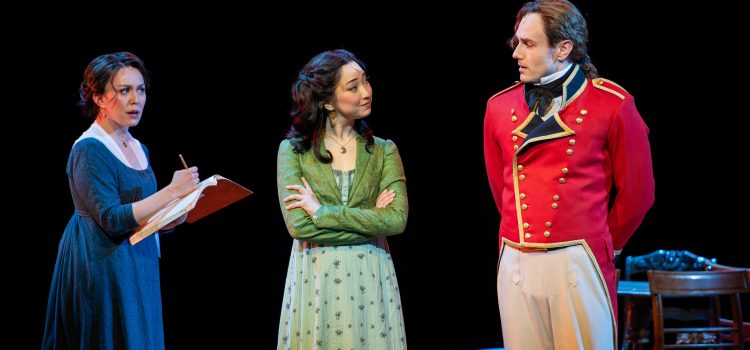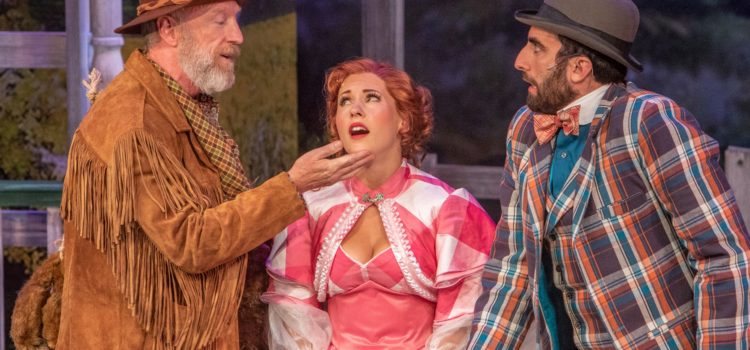By Lynn Venhaus
With words of wit and strong female leads, “Austen’s Pride” has promise to fulfill its potential, coinciding with the literary world’s preparations to celebrate Jane Austen’s 250th birthday on Dec. 16.
In its pre-Broadway tryout at Stages St. Louis, a charming, refined cast, with shrewd, fluid direction by Igor Goldin, re-imagines Austen’s most acclaimed work, “Pride and Prejudice” as a double narrative.
The music, however, is a mixed bag — with a few emotionally connecting songs, but most lack depth, have unmemorable melodies, and aren’t necessary to advance the story.. It’s the musical’s weakest element. If reworked, the production could be a fine straight drama, laced with humor, of course.
Considered one of the most important and influential novelists in English literature, Austen crafted memorable characters through her use of irony, humor and realism, and critiques of a patriarchal structure during her lifetime.
She died at age 41 and achieved more fame posthumously for her six novels. Her insightful writing about the everyday lives of women in the 18th and 19th centuries has appealed across generations and cultures.
Therefore, distilling her famous characters into a 2-hour, 30-minute musical was an ambitious undertaking. Lindsay Warren Baker and Amanda Jacobs, who wrote the music, lyrics and book, are faithful to her personal growth story arcs, even if they can’t offer more depth and nuance like a novel does.
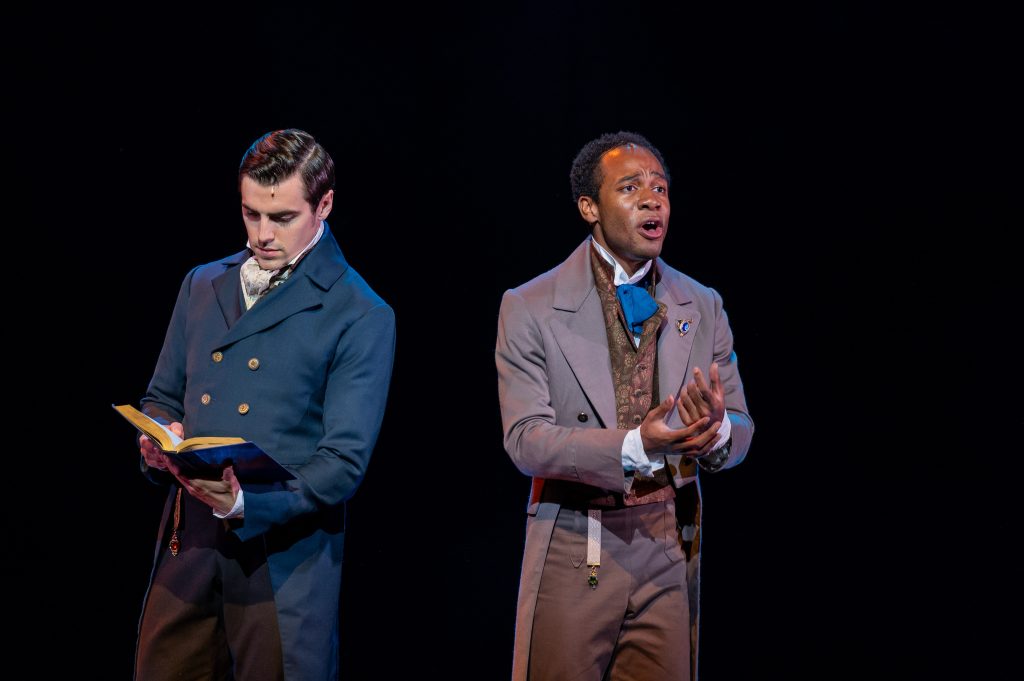
The musical’s premise is that after the success of “Sense and Sensibility,” the happy publisher wants another work from Austen. At the urging of her supportive sister Cassandra (Dianica Phelan), Jane begins re-working “First Impressions,” which she had already started.
As she writes, the characters spring to life. Austen converses with them and thinks aloud about her process, thus beginning her own journey of self-discovery.
The tag team of an engaging Olivia Hernandez as the whip-smart author and Delphi Borich as uncompromising Elizabeth Bennet are the driving force here.
Their “When I Fall in Love” is a captivating duet, as Borich and Hernandez’s enchanting voices blend beautifully.
Your fondness for Austen’s works may factor into your reaction to this work in progress that’s headed on tour to several American cities, with St. Louis the first stop from July 25 to Aug. 24.
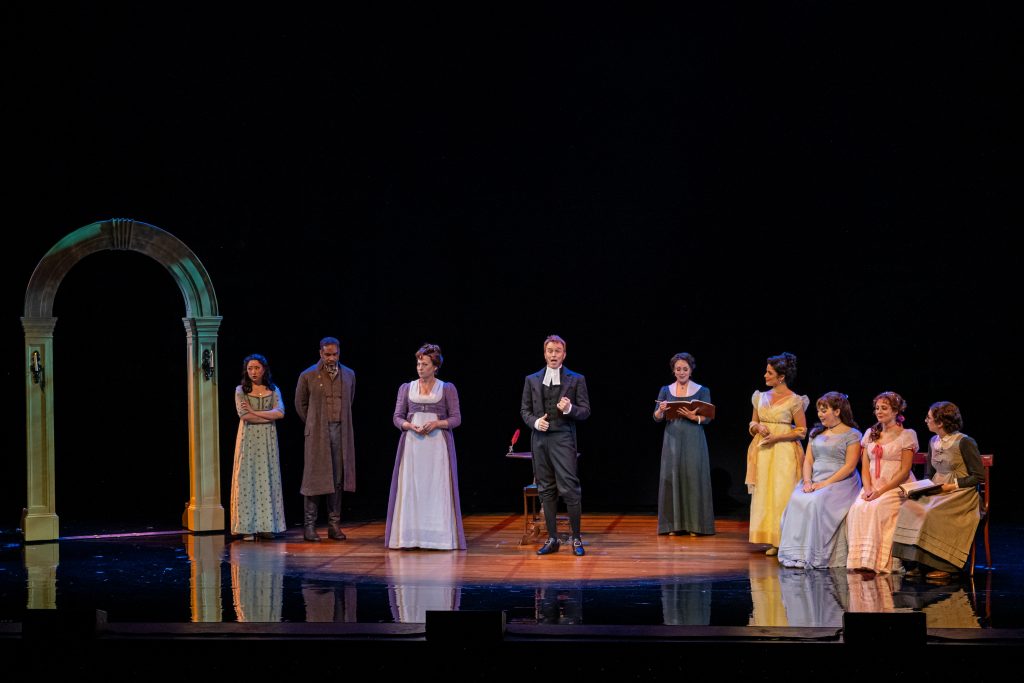
In September, the show will travel to Charlotte, N.C.; Memphis, Tenn.; Newport News, Va.; The Villages in Florida; Oxford, Ala.; Owensboro, Ky.; and Waterbury, Conn. More dates may be announced. Right now, there is no timetable for Broadway, but producer R. Erin Craig is working on that goal.
The musical debuted in March 2019 at A.C.T. of Connecticut, then opened that October in Seattle at the 5th Street Theatre, which has developed other Broadway-bound shows, including “Mrs. Doubtfire.” A one-night-only concert version at Carnegie Hall was performed by eminent Broadway veterans on June 29, 2023.
Austen’s timeless themes of love, family and societal expectations, combined with her sly feminist-leaning social commentary, endure.
Women had limited options, so marriage could improve their social standing and economic security. (Keep in mind the historical context, for these characters are products of their time).
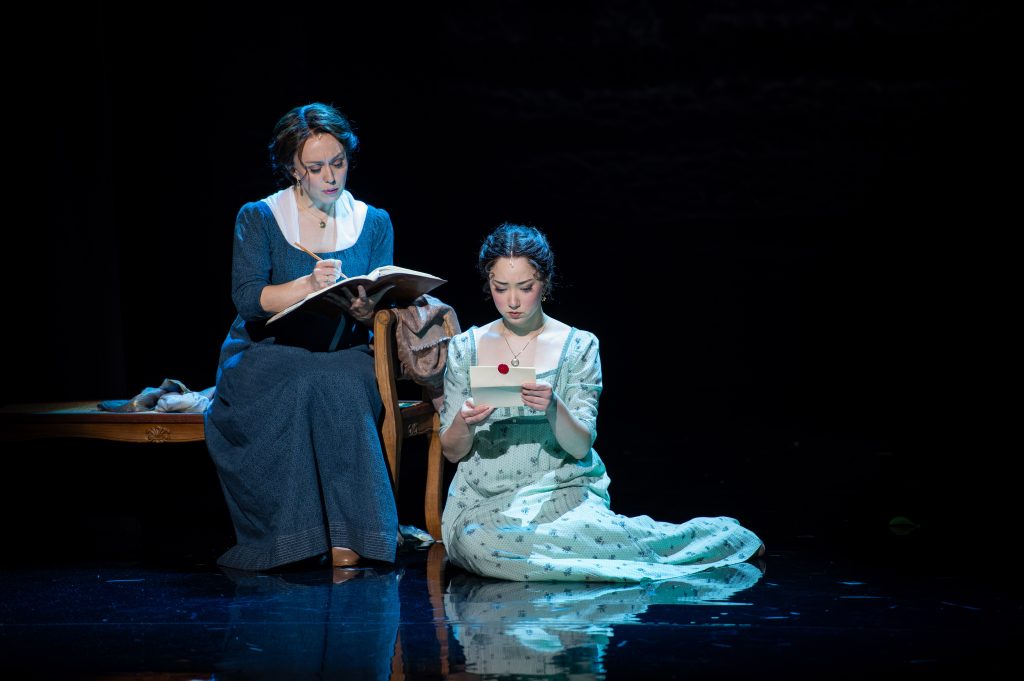
Elizabeth Bennet, the second of five daughters, has an older sister and three younger. Her growing relationship with reserved aristocrat Fitzwilliam Darcy propels the story, while Jane’s romance with the good-natured Charles Bingley, and her younger sister Lydia’s dalliance with disgraced George Wickham, are subplots. Elizabeth rejects the self-important clergyman Mr. Collins’ proposal, thus causing upheaval.
Those not entranced by the Bennet girls’ romantic entanglements and squabbles should be able to grasp the story without a primer.
As the sarcastic and disengaged father, Kevyn Morrow has a fitting solo “Silly Girls.” Critical of others, his favorite is Lizzy. He delivers the best zinger: “Your mother will never see you again if you do not marry Mr. Collins… and I will never see you again if you do.”
Other notable men include a delightful Cole Thompson as the smitten Bingley, Michael Burrell as a charming but untrustworthy Wickham, and Paul Castree as the pompous Collins.
Completing the close-knit Bennet family are Addie Morales as Jane, Sarah Ellis as Mary, Cali Noack as Catherine “Kitty,” and Kate Fahey as Lydia.
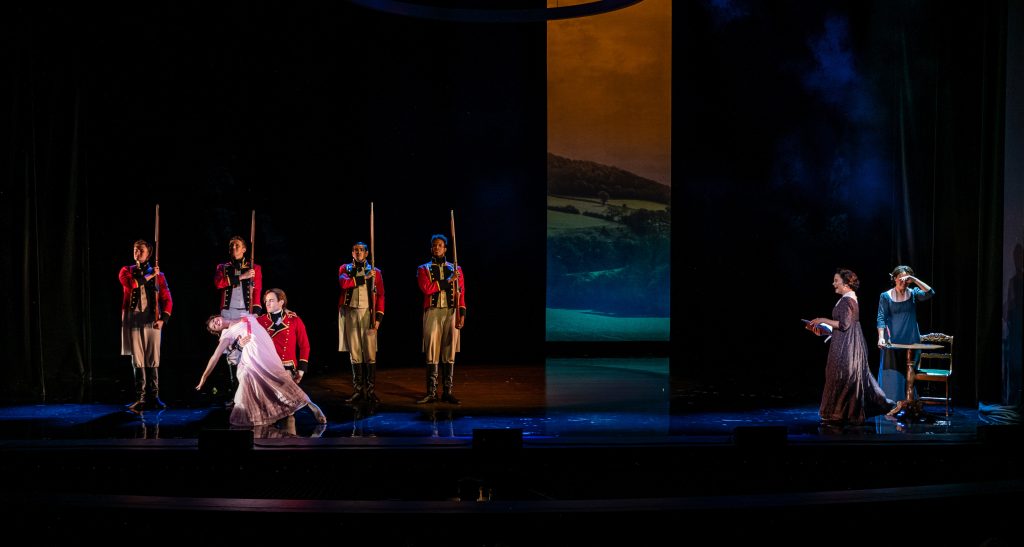
Mrs. Bennet’s social-climbing pretentious, tactless and foolish ways and the two youngest daughters’ giggly immaturity have always annoyed, and the actresses playfully exaggerate those traits.
Besides Mary, Ellis plays Bingley’s sister Caroline and the Bennet girls’ aunt Mrs. Gardiner, with Castree also Mr. Gardiner. Several other performers have multiple roles, including Noack as Georgina Darcy and Luttrell as Tom Lefroy. The cast assumes all their roles with aplomb.
The well-prepared ensemble includes Travis Anderson, Matt Gibson, Keith Johnson, and Drew Tanabe as Redcoats, Brett Rawlings and Graham Keen (Dance Captain) as swings, and Abigail Isom, Jazmin Gorsline, and Caroline Santiago Turner as standbys.
With Colin Firth forever etched as Darcy in the 1995 mini-series, it was harder to accept Matthew Macfadyen in the outstanding 2005 film, but like Dan Hoy here, he grew on me. Because of Darcy’s aloof and arrogant demeanor, it takes awhile to warm up anyway.
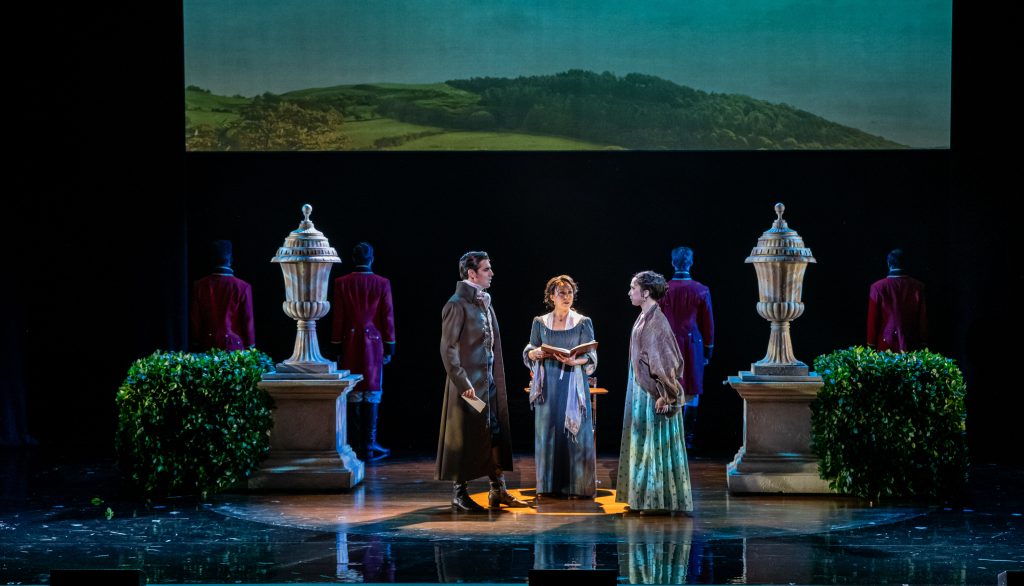
As for the music, the lack of steady catchy melodies is problematic. Most are indistinguishable from each other.
However, that’s not to say that there aren’t a few songs that stand out, for Hoy gorgeously sings Darcy’s “Fine Eyes,” and he poignantly duets with Hernandez on “The Portrait Song.”
In “My Poor Nerves,” Sally Wilfert displays her skills as a nimble comedienne. She also doubles as the insufferable Lady Catherine de Bourgh.
But Lydia’s flirty “I Can’t Resist a Redcoat” must be cut. OK, in that era, girls married in their early teens, but a 15-year-old singing it nowadays is cringey.
So dubbed the Regency era in British history, which spanned 1795 to 1837, that period is often romanticized as a time of elegance and social refinement. Costume designer Emily Rebholz created sumptuous vintage apparel, with impressive ballroom finery. Tommy Kurzman’s hair and wigs designs further illustrated the 19th century look.
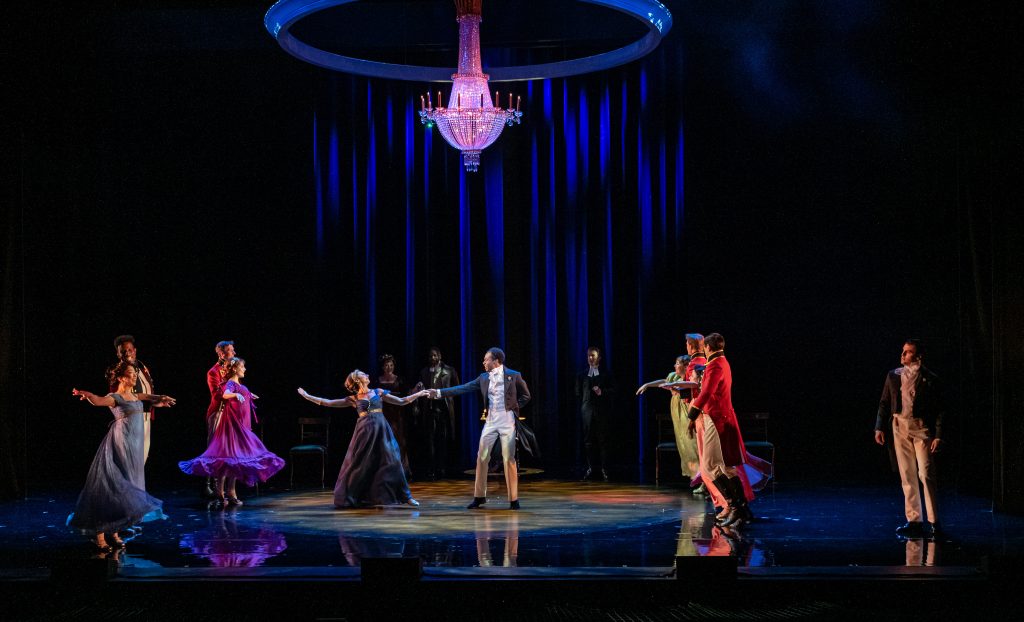
Choreographer Lisa Shriver’s authentic ballroom dances are a high point as well. Music director Sheela Ramesh emphasized the elegance in Jacob’s orchestrations. She conducted a 9-piece orchestra: Reagan Casteel on keyboard, Fiona Brickey on violin, Eileen Burke on oboe, Marcia Erwin on cello, Lea Gerdes on woodwinds, Stephen Hanrahan on French horn, Adam Anello on bass, and Chris Traylor on drums and percussion, with Ramesh on keyboard and Carrie Benton Smith filling in on keyboard at certain performances.
The distinctive style in architecture and art is depicted simply by scenic designer Josh Zengen, more of a suggestion, with minimal objects representing the Bennet country estate Longbourn House, Darcy’s Pemberley and Charles Bingley’s residence Netherfield Park. The video backgrounds augment the minimalist set, showcasing the lush countryside.
Jason Lyons’ lighting design and Phillip Peglow’s sound design are integral to the overall effect, crisp and precise. The director, choreographer, scenic and lighting designers were all attached to the 2019 version, too.
Despite being technically proficient, the show lacks the consistent spark a musical should produce, mainly because it’s too long and has too many songs that sound the same.
For the love story to succeed, Darcy must overcome his pride, and Elizabeth must overcome her prejudice. That’s good advice for everyone moving forward, no matter what generation, fact or fiction.
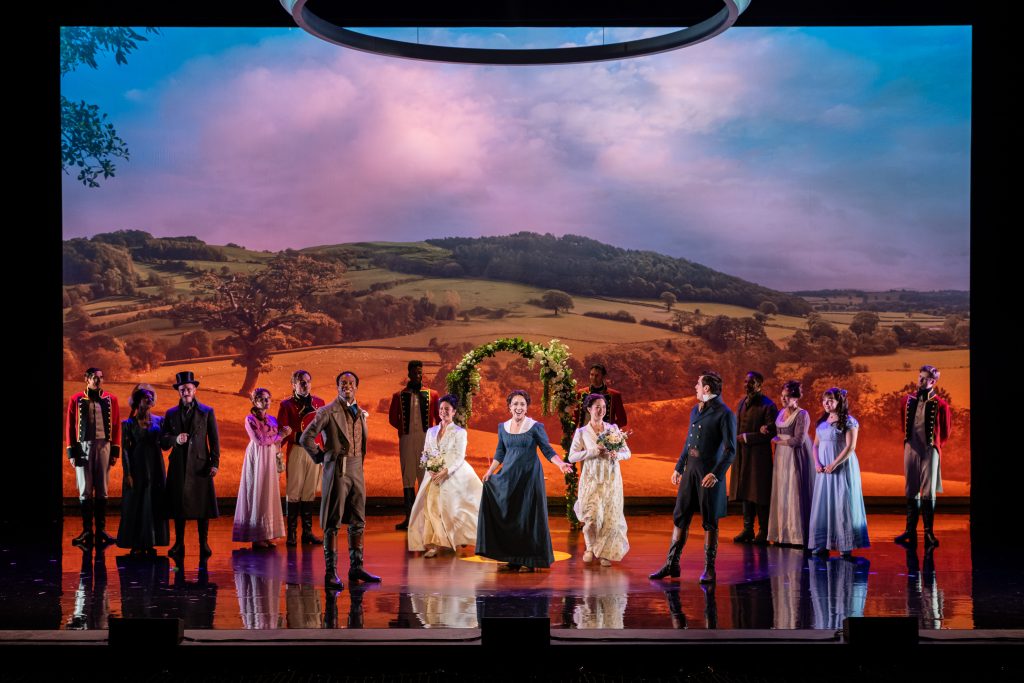
.Stages St. Louis presents “Austen’s Pride” from July 25 to Aug. 24 at the Kirkwood Performing Arts Center. For more information on Austen’s Pride, please visit StagesStLouis.org

Lynn (Zipfel) Venhaus has had a continuous byline in St. Louis metro region publications since 1978. She writes features and news for Belleville News-Democrat and contributes to St. Louis magazine and other publications.
She is a Rotten Tomatoes-approved film critic, currently reviews films for Webster-Kirkwood Times and KTRS Radio, covers entertainment for PopLifeSTL.com and co-hosts podcast PopLifeSTL.com…Presents.
She is a member of Critics Choice Association, where she serves on the women’s and marketing committees; Alliance of Women Film Journalists; and on the board of the St. Louis Film Critics Association. She is a founding and board member of the St. Louis Theater Circle.
She is retired from teaching journalism/media as an adjunct college instructor.

